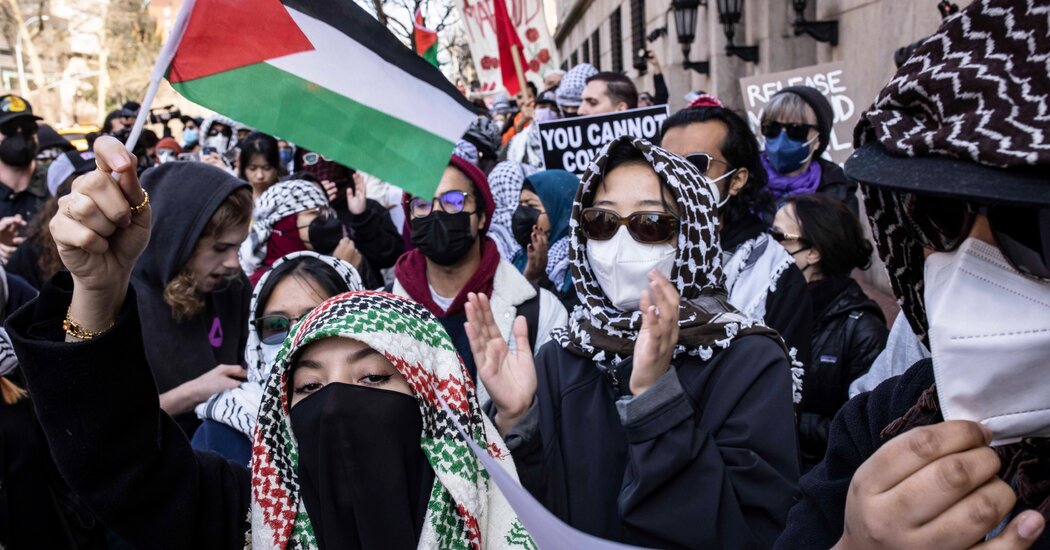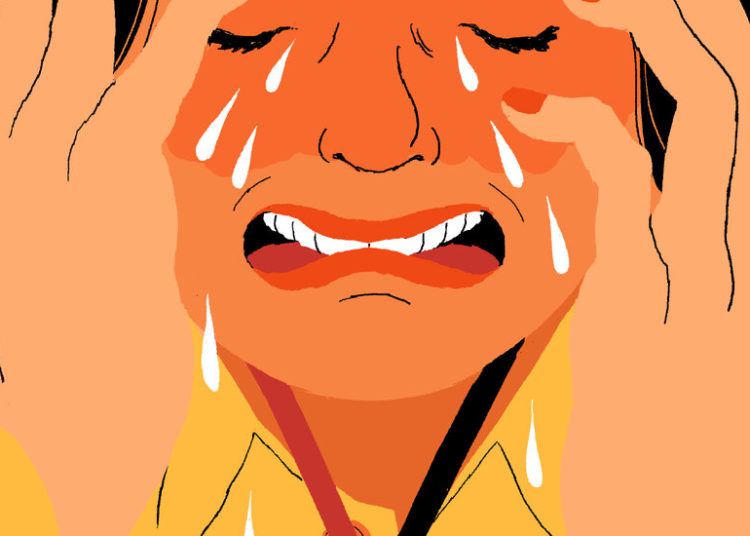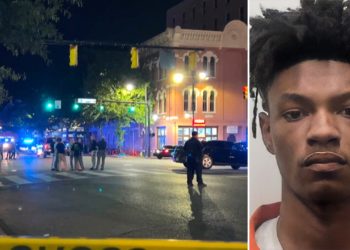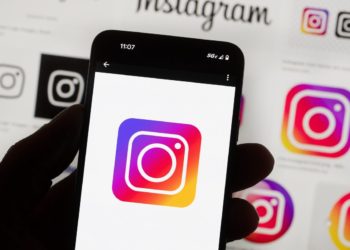A top Trump appointee in the Justice Department ordered an aggressive investigation in the last several months of student protesters at Columbia University, raising anger and alarm among career prosecutors and investigators who saw the demand as politically motivated and lacking legal merit, people familiar with the episode said.
The demand for the inquiry into students who protested Israel’s conduct of the conflict in Gaza also prompted pushback from a federal magistrate judge, who believed some of the steps being sought by the official were unjustified and might violate the First Amendment, the people said.
The breadth of the investigation, conducted by the Justice Department’s civil rights division, has not been previously reported. The ensuing clash highlights the tensions roiling the department as administration officials seek to enact President Trump’s agenda, including redirecting the civil rights division away from its traditional approach of protecting the rights of minority groups with a new mission to fulfill a campaign promise by cracking down on student protesters amid accusations of rampant antisemitism on college campuses.
Those types of demands from political appointees at the Justice Department are part of the reason there has been an exodus of lawyers from the division in recent weeks, according to current and former officials.
The federal investigation into student protesters at Columbia appears to have stalled for now, but it represents one of the most contentious episodes yet inside the Justice Department during Mr. Trump’s second term. The dispute has left lingering ill will within the department, as well as the courts and the F.B.I., the people said.
Asked for comment, Todd Blanche, the deputy attorney general, said, “This is a false story fabricated by a group of people who allowed antisemitism and support of Hamas terrorists to fester for several years, standing by but doing nothing.”
The Trump administration has vowed to take on campus protests against Israel’s military campaign in the Gaza Strip, saying they reflect antisemitism that must be punished. Those efforts are aimed at both college administrators, who Trump officials say should have done more to rein in campus protests, and student activists themselves, some of whom immigration officials have detained. Activists, in turn, accuse the authorities of conflating criticism of Israeli and U.S. policy with antisemitism.
The investigation began shortly after masked protesters barged into Milbank Hall, a building at Barnard College, on Feb. 26 to demonstrate against the expulsion of students who had been accused of disrupting a “History of Modern Israel” class. Video shows students pushing past a security guard and occupying a hallway. School officials said at the time that the guard was assaulted and taken to the hospital for minor injuries.
Emil Bove III, a senior Justice Department official, ordered an immediate investigation, primarily of one particular student group, Columbia University Apartheid Divest, according to three people with knowledge of the matter, who spoke on the condition of anonymity to discuss details intended to remain private.
Prodded by Mr. Bove, prosecutors in the civil rights division were told to obtain a membership list of the group. Investigators, however, pushed back on those instructions because they were skeptical such a list even existed, given the amorphous nature of online forums, and even if it did, scrutinizing people for their membership seemed like a possible violation of their First Amendment rights, these people said.
One of the Justice Department lawyers assigned to the case was Samantha Trepel, an experienced civil rights prosecutor who secured a federal conviction against Derek Chauvin, the Minneapolis police officer who killed George Floyd in 2020, these people said.
The prosecutors were told by superiors that Mr. Bove was seeking a list so the information could be shared with immigration agents, these people said. Inside the civil rights division, prosecutors came to fear that their criminal investigation was a pretext to facilitate an intimidation and deportation campaign by the Trump administration against student protesters, these people said. Prosecutors refused to compile such a list that could be given to Immigration and Customs Enforcement agents, these people said.
Mr. Bove then shifted his focus to obtaining a search warrant for the group’s Instagram account, these people said. He ordered prosecutors to apply for a search warrant for the nonpublic data associated with the account, these people said.
The premise of the application was also contentious within the department. Mr. Bove insisted that the Instagram account in question had been used to make a threat, while line prosecutors said the statement at issue did not meet the legal definition of a threat, these people said. In late March, the social media company suspended the group’s account for failing to meet its “community standards.”
Mr. Blanche, in his statement, added that the warrant application focused on Columbia University Apartheid Divest “included a photograph from C.U.A.D.’s social media of an inverted triangle symbol used by Hamas to designate targets for violence, which was spray-painted on Columbia property along with red paint designed to look like blood.”
He said the investigation was “ongoing,” appearing to point to a related criminal investigation that the federal authorities have pursued, one that “included an independent magistrate judge finding probable cause to believe that there was evidence on Columbia property of harboring and concealing illegal aliens.”
Before Mr. Trump delivered a speech to the Justice Department on March 14, Mr. Blanche told the audience that the department was investigating whether anyone involved in the campus protests at Columbia violated civil rights laws and antiterrorism laws.
Mr. Blanche projected unwavering certainty about the wisdom of such an investigation. But behind the scenes, career lawyers had profound doubts about the merits of the case they were assigned, and deep concerns about the potential consequences if they refused.
Mr. Bove’s demands frustrated people in the civil rights division, but many of the managers were afraid to push back, having watched a month earlier as Mr. Bove pressed prosecutors in a different division, the public integrity section, to drop criminal charges against Mayor Eric Adams of New York, the three people said. That section, which once had about 30 lawyers, now has only a handful.
Bennett Gershman, a Pace University law professor who specializes in prosecutorial ethics, said the described conduct of Mr. Bove was “staggering.”
“He did something that prosecutors are absolutely forbidden to do — use the law enforcement powers of the government to try to intimidate these individuals or destroy their rights,” Mr. Gershman said. “This is so far past the line of prosecutorial professionalism and the commitment to principles of justice.”
In his statement, Mr. Blanche said that “unethical and inaccurate claims from deep state terrorist sympathizers who stood by as members of the Jewish faith were targeted across the country” would not deter Pam Bondi, the attorney general, and the Justice Department from “aggressively investigating criminal conduct and rooting out antisemitism.”
When the federal prosecutors involved in the investigation of student protesters applied for a search warrant, a magistrate judge in New York rejected the request, finding that the government did not have sufficient probable cause, these people said.
In an unusual move, Mr. Bove insisted that the prosecutors appeal the ruling to a district court judge, these people said. After weighing the request, Judge John G. Koeltl of Federal District Court of the Southern District of New York instructed the chief magistrate judge, Sarah Netburn, to reconsider the application, the people said.
But the second time, the government lawyers fared even worse. Judge Netburn not only rejected the request for a search warrant, but she also ordered the government to abide by a special condition: Should prosecutors ever try to refile such an application before another federal judge, they had to include a transcript of the sealed discussions in her court, these people said.
Part of the judge’s skepticism, these people said, stemmed from the absence from the case of lawyers with the Manhattan federal prosecutor’s office. But prosecutors in the Southern District of New York were wary of signing onto the effort and had minimal involvement with it, these people said. A spokesman for the U.S. attorney’s office in Manhattan declined to comment.
While civil rights prosecutors conducted the investigation that Mr. Bove had demanded, they often pushed back against specific steps that he wanted taken, these people said, arguing that they were either not justified by the available facts or contrary to law and past practice, or both.
At one point, Mr. Bove instructed F.B.I. agents on the joint terrorism task force in New York to put on their raid jackets, go to Columbia’s campus and stand in a phalanx near any protesters. Within the civil rights division, the instruction was viewed as deeply improper and a blatant attempt to intimidate students, these people said. The F.B.I. agents did not make any such show of force.
By early April, the investigation seemed to have largely died, but nothing prevents Mr. Bove or others from reviving it. In its wake, however, people familiar with the case said it had only exacerbated the ill will and distrust between political appointees at the Justice Department’s headquarters in Washington and the prosecutor’s office in New York, as well as between those political appointees and veterans of the civil rights division.
Devlin Barrett covers the Justice Department and the F.B.I. for The Times.
The post Orders to Investigate Columbia Protesters Raised Alarms in Justice Dept. appeared first on New York Times.




